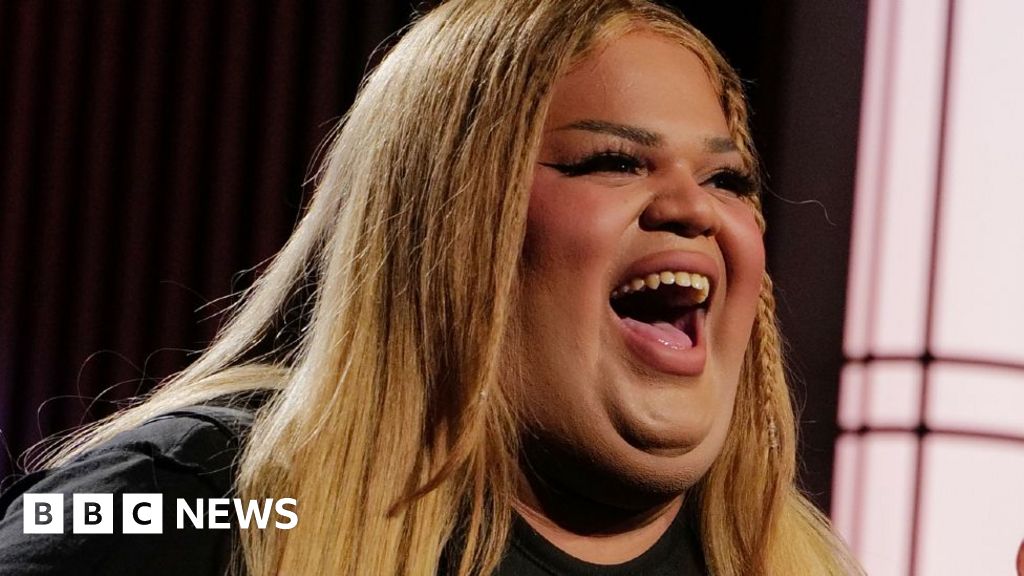 Disney/Randy Holmes
Disney/Randy HolmesIf brat described our wild and unapologetically messy summers, then exemplary manners, politeness and being a stickler for rules is what’s taking us into autumn.
In recent weeks, thousands of videos showing us how to refine our etiquette have popped up on TikTok, all off the back of the “very demure, very mindful” trend.
The satirical idea started out as poking fun at the stereotypical ideas of femininity, but it has since taken on a life of its own.
While half of the internet are using the phrase ironically, others are concerned that the trend is just another way of setting unrealistic standards for women.
So, is anyone actually trying to be demure, or is this just a massive in-joke that’s been blown out of proportion?
The seemingly harmless catchphrase was coined by content creator Jools Lebron, who posted a TikTok earlier this month on her demure work outfit and mindful make-up.
“You see how I do my make-up for work? Very demure, very mindful,” she told her millions of followers.
“A lot of you girls go to the interview looking like Marge Simpson and go to the job looking like Patty and Selma. Not demure.”
Allow TikTok content?
She also reminds us that when dressing for the office, her shirt “only has a little chi-chi out, not my cho-cho”, adding: “You should never “come to work with a green cut crease”.
After achieving overnight fame with her videos, the internet sensation has quit her checkout job, appeared on Jimmy Kimmel Live!, and updated fans that she’s now able to finance her gender transition.
Not only have content creators and celebrities been jumping on the trend, but even companies like Nasa have joined the bandwagon.
“You see how Earth looks in space? It’s very demure, very mindful. Earth looks very cutesy in the solar system,” the space agency posted on X.
 Getty Images
Getty ImagesDemure has also made its way into our fashion – content creator Ambika Dhir says being “demure and mindful in outfits is about well-crafted quiet luxury, chic outfits and a strong personal style that grabs attention without being shouty”.
Similarly, Isa Lavahun, a social media strategist, says she interprets Lebron’s demure catchphrase as the “embodiment of subtle self-love – knowing that as long as you carry yourself with grace and empathy, no other opinion matters”.
But, not everyone sees it like that.
One Tik Toker, Sabrina Thulander, says she’s “always interpreted demure as a negative thing, like how a Victorian era man wants his wife to act. It all feels very trad wife to me”.
But some women have been leaning into the trad wife trend, which has risen in popularity due to the artistic portrayal of women in shows like Bridgerton and Downton Abbey who are demure and mindful.
 Netflix
NetflixAuthor Gershom Mabaquiao explains that the trend started off being about “the unseriousness of self-presentation”, but since it has become bigger than social media and permeated society, it’s being interpreted in a “very literal way”.
The fact some people are posting about being demure, cutesty and mindful in a serious way shows “how nuances are lost when messages travel from the high-context in-groups to the low-context outgroups”, he says.
“The sarcasm and deliberate ‘double standards’ of the joke has gotten lost.”
Nöel Wolf, a cultural and linguistic expert, says the word demure dates back to the 1600s, and was used a lot in the 1800s to describe young women who were “modest and reserved”.
The recontextualisation of the word now shows “how old language can take on a new life in the hands of the younger generations”.
 Disney
DisneyAs TikTok trends come and go at an increasingly rapid pace, it’s hard to know which word or phrase will be the next big thing.
A former English teacher and now content creator who goes by the name of ExemplaryPotato, shares new words every week on the platform.
In response to demure, he has shared a video explaining the meaning of vituperative, an antonym to demure.
Wolf says the phrases that Gen Z have used this year are unexpected and obscure, like raw dogging, rizz and bed rotting.
He added that demure isn’t the “only archaic word making a comeback this year” as Inside Out 2 brought “ennui” back into fashion, while Taylor Swift’s Tortured Poets Department re-popularised the word “tryst”.
“There’s a tendency for online trends to yo-yo: we moved from the clean girl aesthetic to brat summer as a rejection of that, and now to “demure”, so, there’s a good chance that whatever the next trend is, it’ll be far from demure.”

